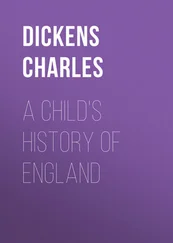All this time, he was afflicted with a terrible unknown disease, which caused him violent and frequent pain that nothing could relieve. He bore it, as he had borne all the troubles of his life, like a brave good man, until he was fifty-three years old; and then, having reigned thirty years, he died. He died in the year nine hundred and one; but, long ago as that is, his fame, and the love and gratitude with which his subjects regarded him, are freshly remembered to the present hour.
In the next reign, which was the reign of EDWARD, surnamed THE ELDER, who was chosen in council to succeed, a nephew of KING ALFRED troubled the country by trying to obtain the throne. The Danes in the East of England took part with this usurper (perhaps because they had honoured his uncle so much, and honoured him for his uncle’s sake), and there was hard fighting; but, the King, with the assistance of his sister, gained the day, and reigned in peace for four and twenty years. He gradually extended his power over the whole of England, and so the Seven Kingdoms were united into one.
When England thus became one kingdom, ruled over by one Saxon king, the Saxons had been settled in the country more than four hundred and fifty years. Great changes had taken place in its customs during that time. The Saxons were still greedy eaters and great drinkers, and their feasts were often of a noisy and drunken kind; but many new comforts and even elegances had become known, and were fast increasing. Hangings for the walls of rooms, where, in these modern days, we paste up paper, are known to have been sometimes made of silk, ornamented with birds and flowers in needlework. Tables and chairs were curiously carved in different woods; were sometimes decorated with gold or silver; sometimes even made of those precious metals. Knives and spoons were used at table; golden ornaments were worn - with silk and cloth, and golden tissues and embroideries; dishes were made of gold and silver, brass and bone. There were varieties of drinking-horns, bedsteads, musical instruments. A harp was passed round, at a feast, like the drinking-bowl, from guest to guest; and each one usually sang or played when his turn came. The weapons of the Saxons were stoutly made, and among them was a terrible iron hammer that gave deadly blows, and was long remembered. The Saxons themselves were a handsome people. The men were proud of their long fair hair, parted on the forehead; their ample beards, their fresh complexions, and clear eyes. The beauty of the Saxon women filled all England with a new delight and grace.
I have more to tell of the Saxons yet, but I stop to say this now, because under the GREAT ALFRED, all the best points of the English- Saxon character were first encouraged, and in him first shown. It has been the greatest character among the nations of the earth. Wherever the descendants of the Saxon race have gone, have sailed, or otherwise made their way, even to the remotest regions of the world, they have been patient, persevering, never to be broken in spirit, never to be turned aside from enterprises on which they have resolved. In Europe, Asia, Africa, America, the whole world over; in the desert, in the forest, on the sea; scorched by a burning sun, or frozen by ice that never melts; the Saxon blood remains unchanged. Wheresoever that race goes, there, law, and industry, and safety for life and property, and all the great results of steady perseverance, are certain to arise.
I pause to think with admiration, of the noble king who, in his single person, possessed all the Saxon virtues. Whom misfortune could not subdue, whom prosperity could not spoil, whose perseverance nothing could shake. Who was hopeful in defeat, and generous in success. Who loved justice, freedom, truth, and knowledge. Who, in his care to instruct his people, probably did more to preserve the beautiful old Saxon language, than I can imagine. Without whom, the English tongue in which I tell this story might have wanted half its meaning. As it is said that his spirit still inspires some of our best English laws, so, let you and I pray that it may animate our English hearts, at least to this - to resolve, when we see any of our fellow-creatures left in ignorance, that we will do our best, while life is in us, to have them taught; and to tell those rulers whose duty it is to teach them, and who neglect their duty, that they have profited very little by all the years that have rolled away since the year nine hundred and one, and that they are far behind the bright example of KING ALFRED THE GREAT.
Four
England Under Athelstan and the Six Boy-Kings

ATHELSTAN, the son of Edward the Elder, succeeded that king. He reigned only fifteen years; but he remembered the glory of his grandfather, the great Alfred, and governed England well. He reduced the turbulent people of Wales, and obliged them to pay him a tribute in money, and in cattle, and to send him their best hawks and hounds. He was victorious over the Cornish men, who were not yet quite under the Saxon government. He restored such of the old laws as were good, and had fallen into disuse; made some wise new laws, and took care of the poor and weak. A strong alliance, made against him by ANLAF a Danish prince, CONSTANTINE King of the Scots, and the people of North Wales, he broke and defeated in one great battle, long famous for the vast numbers slain in it. After that, he had a quiet reign; the lords and ladies about him had leisure to become polite and agreeable; and foreign princes were glad (as they have sometimes been since) to come to England on visits to the English court.
When Athelstan died, at forty-seven years old, his brother EDMUND, who was only eighteen, became king. He was the first of six boy- kings, as you will presently know.
They called him the Magnificent, because he showed a taste for improvement and refinement. But he was beset by the Danes, and had a short and troubled reign, which came to a troubled end. One night, when he was feasting in his hall, and had eaten much and drunk deep, he saw, among the company, a noted robber named LEOF, who had been banished from England. Made very angry by the boldness of this man, the King turned to his cup-bearer, and said, ‘There is a robber sitting at the table yonder, who, for his crimes, is an outlaw in the land - a hunted wolf, whose life any man may take, at any time. Command that robber to depart!’ ‘I will not depart!’ said Leof. ‘No?’ cried the King. ‘No, by the Lord!’ said Leof. Upon that the King rose from his seat, and, making passionately at the robber, and seizing him by his long hair, tried to throw him down. But the robber had a dagger underneath his cloak, and, in the scuffle, stabbed the King to death. That done, he set his back against the wall, and fought so desperately, that although he was soon cut to pieces by the King’s armed men, and the wall and pavement were splashed with his blood, yet it was not before he had killed and wounded many of them. You may imagine what rough lives the kings of those times led, when one of them could struggle, half drunk, with a public robber in his own dining-hall, and be stabbed in presence of the company who ate and drank with him.
Then succeeded the boy-king EDRED, who was weak and sickly in body, but of a strong mind. And his armies fought the Northmen, the Danes, and Norwegians, or the Sea-Kings, as they were called, and beat them for the time. And, in nine years, Edred died, and passed away.
Then came the boy-king EDWY, fifteen years of age; but the real king, who had the real power, was a monk named DUNSTAN - a clever priest, a little mad, and not a little proud and cruel.
Читать дальше













